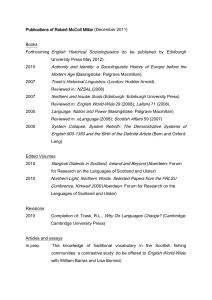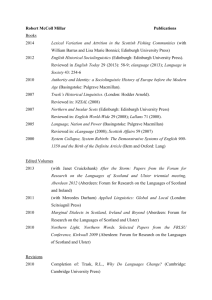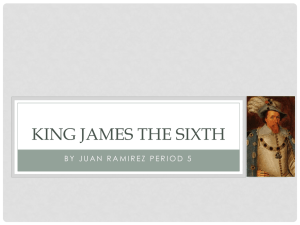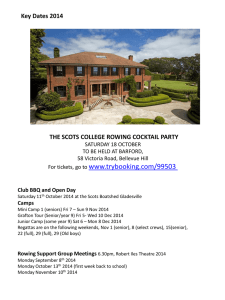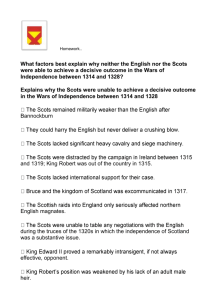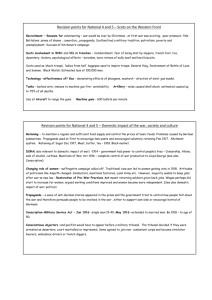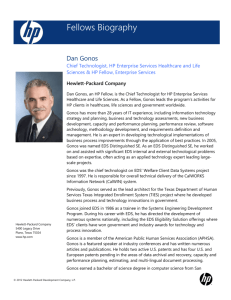Complete List of Publications Robert McColl Millar books 2012
advertisement
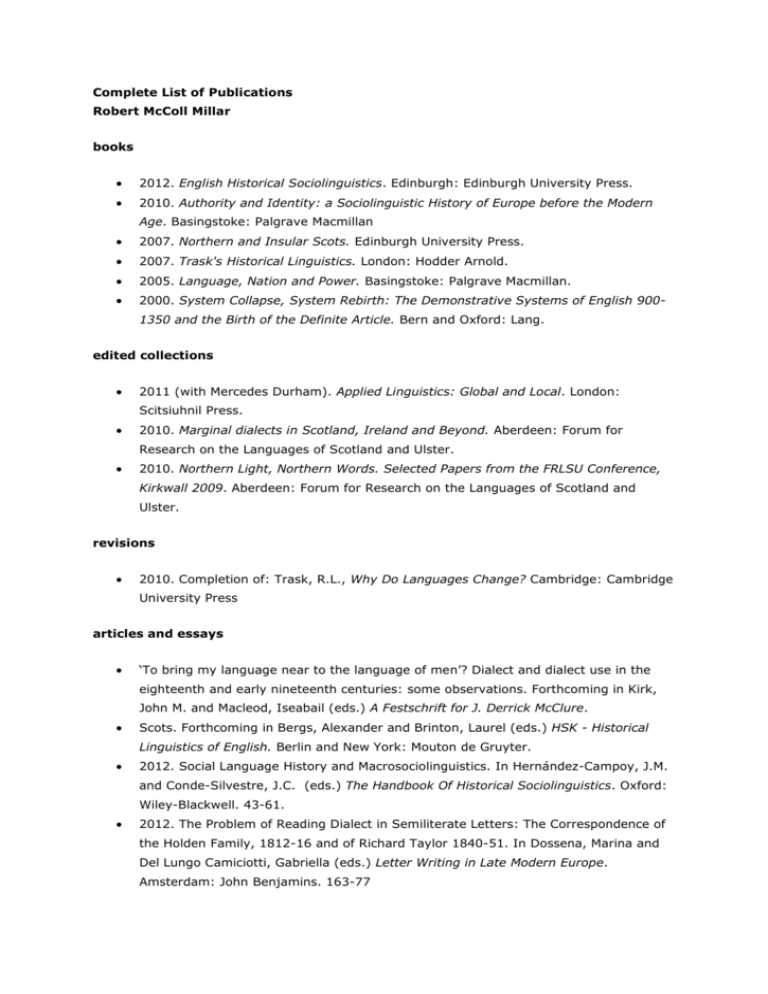
Complete List of Publications Robert McColl Millar books 2012. English Historical Sociolinguistics. Edinburgh: Edinburgh University Press. 2010. Authority and Identity: a Sociolinguistic History of Europe before the Modern Age. Basingstoke: Palgrave Macmillan 2007. Northern and Insular Scots. Edinburgh University Press. 2007. Trask's Historical Linguistics. London: Hodder Arnold. 2005. Language, Nation and Power. Basingstoke: Palgrave Macmillan. 2000. System Collapse, System Rebirth: The Demonstrative Systems of English 9001350 and the Birth of the Definite Article. Bern and Oxford: Lang. edited collections 2011 (with Mercedes Durham). Applied Linguistics: Global and Local. London: Scitsiuhnil Press. 2010. Marginal dialects in Scotland, Ireland and Beyond. Aberdeen: Forum for Research on the Languages of Scotland and Ulster. 2010. Northern Light, Northern Words. Selected Papers from the FRLSU Conference, Kirkwall 2009. Aberdeen: Forum for Research on the Languages of Scotland and Ulster. revisions 2010. Completion of: Trask, R.L., Why Do Languages Change? Cambridge: Cambridge University Press articles and essays ‘To bring my language near to the language of men’? Dialect and dialect use in the eighteenth and early nineteenth centuries: some observations. Forthcoming in Kirk, John M. and Macleod, Iseabail (eds.) A Festschrift for J. Derrick McClure. Scots. Forthcoming in Bergs, Alexander and Brinton, Laurel (eds.) HSK - Historical Linguistics of English. Berlin and New York: Mouton de Gruyter. 2012. Social Language History and Macrosociolinguistics. In Hernández-Campoy, J.M. and Conde-Silvestre, J.C. (eds.) The Handbook Of Historical Sociolinguistics. Oxford: Wiley-Blackwell. 43-61. 2012. The Problem of Reading Dialect in Semiliterate Letters: The Correspondence of the Holden Family, 1812-16 and of Richard Taylor 1840-51. In Dossena, Marina and Del Lungo Camiciotti, Gabriella (eds.) Letter Writing in Late Modern Europe. Amsterdam: John Benjamins. 163-77 2012. The death of Orkney Norn and the genesis of Orkney Scots. Scottish Language 29: 16-36. 2011. Linguistic democracy? In Kirk, John M. and Ó Baóill, Donall (eds.) Sustaining Minority Language Communities: Northern Ireland, the Republic of Ireland, and Scotland. Belfast: Cló Ollscoil na Banríona. 218-24. 2010. Linguistic marginality in Scotland: Scots and the Celtic languages. In Millar, Robert McColl (ed.) 2010. Marginal Dialects: Scotland, Ireland and Beyond. Aberdeen: Forum for Research on the Languages of Scotland and Ulster. 5-17 2010. An historical national identity? The case of Scots. In Llamas, Carmen and Watt, Dominic (eds.) Language and Identities. Edinburgh: Edinburgh University Press. 24756. 2009. Dislocation: is it presently possible to envisage an economically based Language Policy for Scots in Scotland? In Kirk, John M. and Ó Baóill, Donall (eds.) Language and Economic Development: Northern Ireland, the Republic of Ireland, and Scotland. Belfast: Cló Ollscoil na Banríona. 186-95. 2009. The Origins of the Northern Scots Dialects. In Dossena, Marina and Lass, Roger (eds.) Studies in English and European Historical Dialectology. Bern: Peter Lang. 191208. 2008. The origins and development of Shetland dialect in light of dialect contact theories. English World-Wide 29: 237-67. 2006. 'Burying alive': unfocussed governmental language policy and Scots. Language Policy. 5: 63-86. 2006. History of Morphology. In Momma, Haruko & Matto, Michael (eds.). Blackwell Companion to the History of the English Language. Oxford: Blackwell. 43-56. 2006. On the cusp: Antoine Meillet as a sociologist of language. Forthcoming in Love, Nigel (ed.). Language and History. Integrationist Perspectives. Routledge Advances in Communication and Linguistic Theory 4. London and New York: Routledge. 99-119. 2004. Kailyard, conservatism and Scots in the Statistical Account of Scotland. In Kay, Christian J., Hough, Carole & Wotherspoon, Irené (eds.). New Perspectives on English Historical Linguistics, Volume II: Lexis and Transmission. Current Issues in Linguistic Theory 252. Amsterdam: John Benjamins. 163-76. 2004. Linguistic history on the margins of the Germanic-speaking world: some preliminary thoughts. In McClure, J. Derrick (ed.). Doonsin' Emerauds: New Scrieves anent Scots and Gaelic. Belfast Studies in Language, Culture and Politics 11. Belfast: Cló Ollscoil na Banríona. 3-17. 2003. 'Blind attachment to inveterate custom'. Language Use, Language Attitude and the Rhetoric of Improvement in the first Statistical Account. In Dossena, Marina & Jones, Charles (eds.). Insights into Late Modern English. Linguistic Insights 7. Bern: Peter Lang. 311-30. 2002. After Jones: some thoughts on the final collapse of the grammatical gender system in English. In Fisiak, Jacek (ed.). Studies in English Historical Linguistics and Philology: A Festschrift for Akio Oizumi. Studies in English Medieval Language and Literature 2. Bern: Peter Lang. 293-306. 2002. Language, Genre, and Register: factors in the use of simple demonstrative forms in the South-West Midlands of the thirteenth century. In Allen, Rosamund, Perry, Lucy & Roberts, Jane (eds.). Laʒamon: Contexts, Language, and Interpretation. King's College London Medieval Studies 19. London: King's College London Centre for Late Antique & Medieval Studies. 227-39. 2000. Some suggestions for explaining the origin and development of the definite article in English. In Fischer, Olga, Rosenbach, Anette & Stein, Dieter (eds.). Pathways of Change: Grammaticalization in English. Studies in Language Companion Series 53. Amsterdam: John Benjamins. 275-310. 2000 (with the assistance of Dauvit Horsbroch). Covert and Overt Language Attitudes to the Scots Tongue expressed in the Statistical accounts of Scotland. In Kastovsky, Dieter & Mettinger, Arthur (eds.). The History of English in a Social Context: a Contribution to Historical Sociolinguistics. Trends in Linguistics Studies and Monographs 129. Berlin/New York: Mouton de Gruyter. 169-98. 1999. Some Geographic and Cultural Patterns in the Lexical/Semantic Structure of Scots’. Northern Scotland 18: 55-65. 1997. Some patterns in the non-historical demonstrative realisation of the Peterborough Chronicle annals 1070-1121. Notes and Queries 242: 161-4. 1997 (with Alex Nicholls). Ælfric’s De Initio Creaturae and London, British Library, Cotton Vespasian A.xxii: omission, addition, retention and innovation. In Szarmach, Paul C. and Rosenthal, Joel T. (eds.). The Preservation and Transmission of AngloSaxon Culture. Kalamazoo: Publications of the Center for Medieval Studies. 431-64. 1997. English a koinëoid? Some suggestions for reasons behind the creoloid-like features of a language which is not a creoloid. Vienna English Working Papers 6: 1949. 1996. ‘Why is Lebanon called The Lebanon?’: some suggestions for the grammatical and socio-political reasonings behind the use or non-use of the with the names of nation states in English. Notes and Queries 241: 22-7. 1996. Gaelic-influenced Scots in pre-Revolutionary Maryland. In Ureland, P. Sture and Clarkson, Iain (eds.). Language contact across the North Atlantic. Tübingen: Niemeyer: 387-410. 1995. Ambiguity in Ending and Form, ‘Reinterpretation’ in the Demonstrative Systems of Laʒamon’s Brut. Neuphilologische Mitteilungen 96: 145-68. 1994. A Possible Etymology for Scots smirr ‘traces of rain in the wind’. Notes and Queries 239: 312-4 1994. Ambiguity in Function: Old English Þæt and the Demonstrative Systems of Laʒamon’s Brut. Neuphilologische Mitteilungen 95: 415-32. dictionary fascicles 1994. Contributions to: The Letter A, the fifth fascicle of The Dictionary of Old English. Toronto: Pontifical Institute for Medieval Studies. 1992. Contributions to: The Letter Æ, the fourth fascicle of the Dictionary of Old English. Toronto: Pontifical Institute for Medieval Studies. 1992. Contributions to: Beon, by Matti Kilpiö, supplement to the Dictionary of Old English, attested spellings by Robert Millar using the materials assembled by Haruko Momma.Toronto: Pontifical Institute for Medieval Studies. Reviews in English World-Wide, English Language and Linguistics, Journal of Germanic Linguistics, Journal of Scottish Place-Name Studies, Journal of Sociolinguistics, Language, LinguistList, Notes and Queries and Scottish Language.
